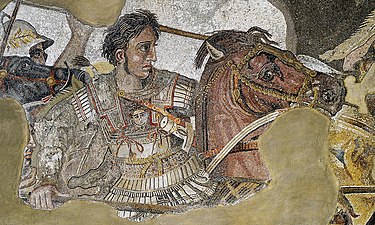Hellenization in the Byzantine Empire
However, the wider academic consensus acknowledges its central role in the formulation and transformation of the Byzantine Empire throughout the over one thousand years of its existence.
Despite these Roman Imperial roots, the geographically and largely Hellenic Byzantine Empire[4] witnessed multiple periods of Hellenisation and a departure from its Latin associations from its founding in 330 to its fall in 1453.
[11] Following Diocletian's reforms in the 3rd century CE, there was a decline in the knowledge of Greek in the West, with Latin reasserted as the language of power in the East.
It later fragmented into the incipient romance languages in the 8th century CE, following the collapse of the West with the Muslim invasions that broke the connection between speakers.
For example, the theological debates in the Christian Church increased the importance of the Greek language, in turn making it highly dependent on Hellenic thought.
Lactanitus and Clement of Alexandria also served as key contributors to the theory, that was solidified and instituted by Byzantine Eusebius of Caesarea in a finalistic and concluding doctrine.
For example, according to Byzantinist Anthony Kaldellis: "In 1054 he [Psellos] was accused by the future Patriarch John Xiphilinos, of forsaking Christ to follow Plato.
This central cultural aspect of Hellenisation in Byzantium spanned from artistic and architectural styles and mediums appropriated by the Byzantines from Hellenic antiquity, to the poetic, theatrical and historiographical modes of writing and expression associated with ancient Greek literature, idolism and philosophy.
Due to the rise of Imperial Byzantine power and successful military campaigns against Arab forces, a bolstering of the Empire's treasuries and an economic boom led to greater cultural and artistic preoccupation and neoclassical sentiment.
[28] In her esteemed historical work recounting the Crusades of the 12th century which threatened Byzantium's lands in the East, The Alexiad utilises clear classical Greek styles of epic poetry and rhetoric, associated with Homer and a historiographical "empirical spirit" of historians such as Thucydides, striving to derive historical accounts from first hand experience.
As historian Lenora Neville notes: Originally written in Greek in the 12th century (1148) and initially edited in 1651, the Alexiad depicts the events of the Crusades against the grain of common forms of historiography during the period.

